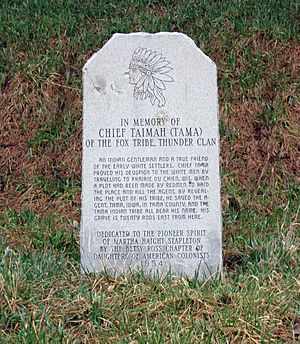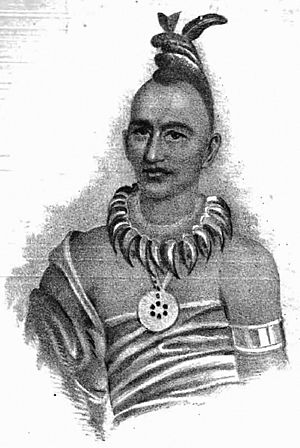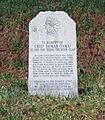Taimah facts for kids
Taimah (born around 1790, died 1830) was an important leader of the Meskwaki people. The Meskwaki are also known as the Fox tribe. Taimah lived in the early 1800s in areas that are now Wisconsin, Iowa, and Illinois. His name had many spellings, like Taiomah or Tama. It meant "sudden crash of thunder" or simply "thunder." He was often called Chief Tama and was one of the leaders who signed a treaty in 1824. This treaty gave land to the United States.
Taimah's Life Story
Taimah was born into a Meskwaki family in their traditional lands, which are now part of Wisconsin. His name, Ty-ee-ma, meant "sudden crash of thunder" in the Meskwaki language. As he grew up, the Meskwaki people faced more and more pressure from the United States moving into their lands.
Taimah became well-known among Americans for saving the life of a U.S. government agent. This agent was at Prairie du Chien, Wisconsin, and Taimah warned him about a plan to harm him. The Meskwaki people had lived for a long time around the Great Lakes, in areas like Wisconsin, Michigan, and Illinois, before moving into Iowa.
After the Meskwaki moved from Wisconsin, Taimah became a main leader of one of their villages. This village was near what later became Burlington, Iowa. He also had a village near Gladstone, Illinois in the 1820s.
In 1820, a man named Jedidiah Morse interviewed Taimah at Fort Armstrong in Illinois. Morse was collecting information about Native American tribes for the U.S. government. He wrote that Taimah seemed very smart but did not want to share much about his people's history or customs. Taimah told Morse that the Great Spirit wanted Native Americans to hunt and live in the wilderness. He believed that if his people tried to live like white people, the Great Spirit would be unhappy, and they would soon die.
Taimah signed the 1824 treaty in Washington, D.C. Through this agreement, the Meskwaki gave up a lot of their land in Wisconsin to the United States.
Taimah passed away in 1830. He is buried near what is now Kingston, Iowa. His grave is in a small area of trees and plants within a cornfield, not far from the Mississippi River. A stone with his name is located nearby. This burial site is on private land and is not open to visitors.
What Taimah Left Behind

- The city of Tama, Iowa, and Tama County, Iowa, were named after him. The city of Tama is close to the Meskwaki Settlement. This settlement was started in 1857 when the Meskwaki were allowed to buy land in Iowa.
Taimah's son was Appanoose, who also became a chief. Appanoose County, Iowa was named after him.
Images for kids
-
Taimah's grave marker, near, Kingston, Iowa. The image on the grave shows Taimah with a stylized Plains Indian headdress, which was not typical of his people's attire; the "Tama Indian Tribe" refers to the Meskwaki who lived at the Meskwaki Settlement.
 | Tommie Smith |
 | Simone Manuel |
 | Shani Davis |
 | Simone Biles |
 | Alice Coachman |




